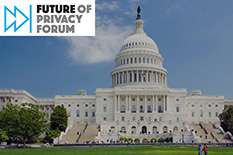MC2 Researchers Win Privacy Papers Awards for Data Access and AI Legal Insights
Researchers working in the Maryland Cybersecurity Center (MC2) were recently honored with two student paper awards from the Future of Privacy Forum’s (FPF) 15th annual Privacy Papers for Policymakers Awards. The papers highlighted MC2 work involving data access rights and the legal implications of AI. FPF is a global nonprofit that unites evaluates the societal, policy and legal impacts of data use, identifies risks, and develops protections. Its annual awards competition recognizes research and scholarship relevant to U.S. policymakers and international data protection authorities. One of the papers recognized this year, “Data Subjects' Reactions to Exercising Their Right of Access,” was co-authored by MC2 Director Michelle Mazurek and students and faculty from the University of Chicago. Led by Arthur Borem, a Ph.D. student at the University of Chicago, the paper examines how individuals engage with personal data retrieved from companies through Data Subject Access Requests. Their study reveals that while people are eager to understand the level of data that companies collect, they often struggle to navigate the complexities of that information and can sometimes find it concerning. The research study’s 33 participants experienced a mix of nostalgia, confusion and discomfort when reviewing their collected data from Amazon, Facebook, Google, Spotify or Uber, revealing gaps in transparency and underscoring the need for more user-friendly disclosure methods. This research highlights the importance of refining privacy laws and corporate practices to ensure individuals can meaningfully engage with their data, Mazurek says. In another award, Nathan Reitinger, a sixth-year computer science doctoral student advised by Mazurek, received an honorable mention for his essay, “Artificial Intelligence is Like a Perpetual Stew.” The paper, which was published in the American University Law Review, provides a clear and accessible breakdown of artificial intelligence (AI) and its legal implications. Reitinger argues that while AI is now deeply embedded in everyday life—shaping everything from entertainment recommendations to military technology—the legal system is unprepared to address its consequences. Using the metaphor of a “perpetual stew,” he explains how AI models are built, trained and continuously refined. By providing the legal community with a foundational understanding of AI, Reitinger’s work offers a clear framework for analyzing its legal challenges and underscores the need for policymakers to craft proactive legislation that accounts for AI’s evolving nature and its risks to privacy. Mazurek, an associate professor of computer science with an appointment in the University of Maryland Institute for Advanced Computer Science, expressed pride in the acknowledgment of MC2’s work. “These awards highlight the real-world impact of our research in privacy and security,” she says. “It’s incredibly rewarding to see our students and collaborators recognized for their work, and it reinforces the importance of tackling these critical issues with rigorous, thoughtful scholarship.” —Story by Melissa Brachfeld, UMIACS communications group
Related Articles: March 28, 2025 Prev Next |


